人教版高中英语必修四 Unit 4 Body language Language points课件(共54张PPT)
文档属性
| 名称 | 人教版高中英语必修四 Unit 4 Body language Language points课件(共54张PPT) |

|
|
| 格式 | pptx | ||
| 文件大小 | 1.6MB | ||
| 资源类型 | 教案 | ||
| 版本资源 | 人教版(新课程标准) | ||
| 科目 | 英语 | ||
| 更新时间 | 2020-11-18 10:20:55 | ||
图片预览


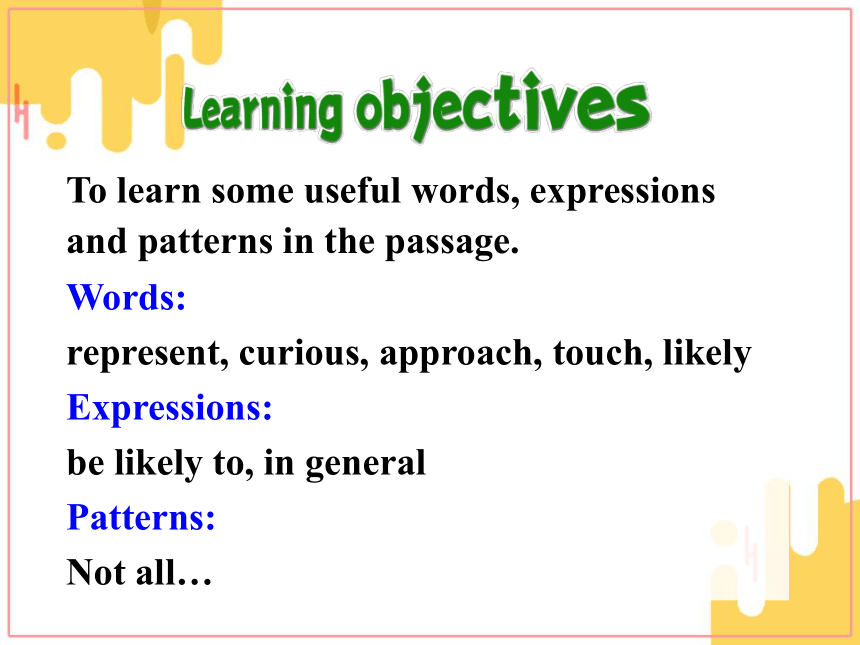
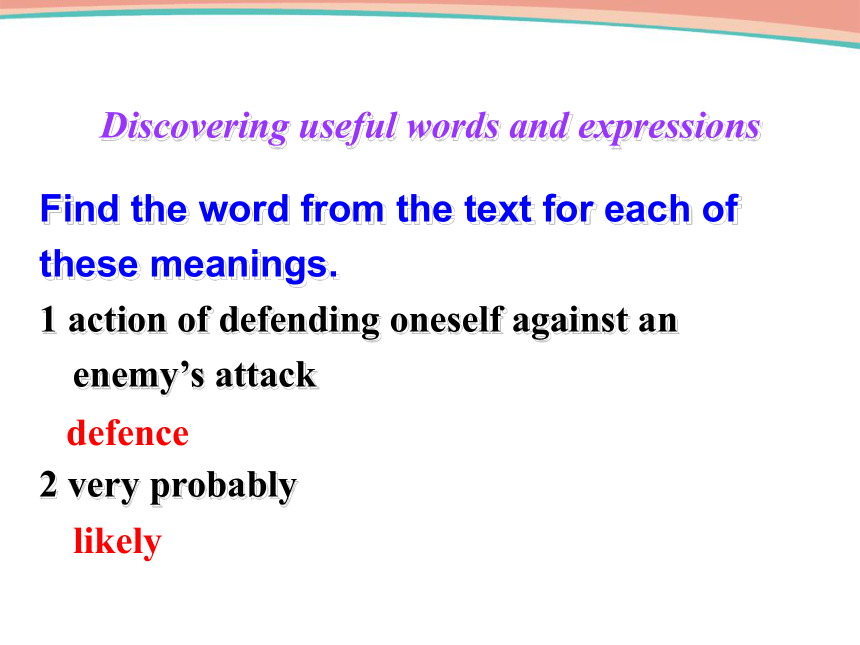
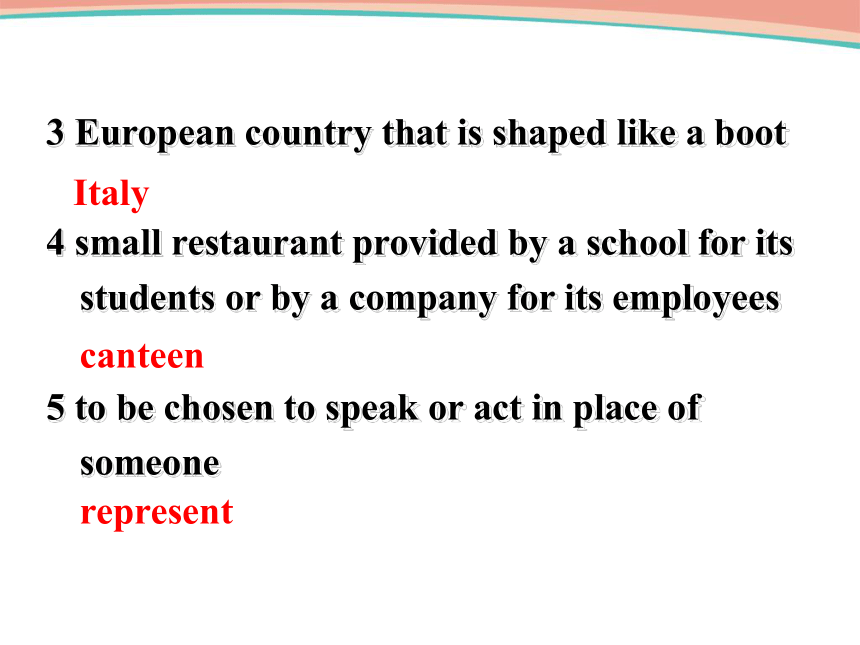
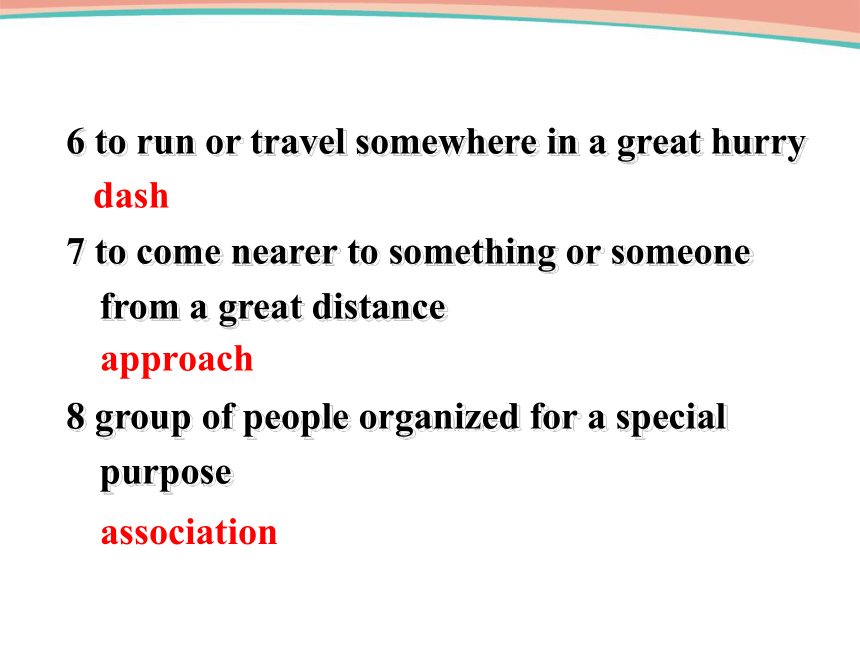
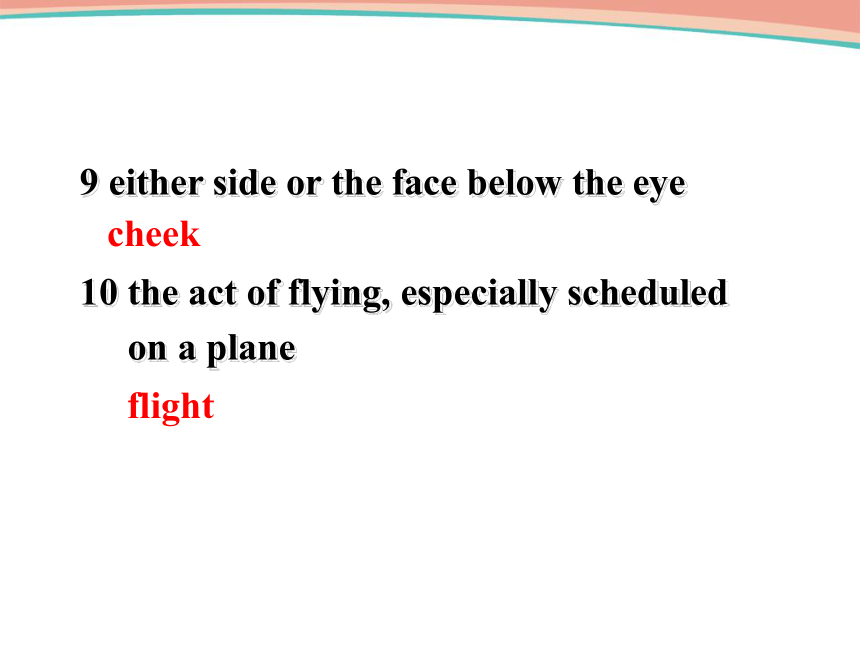

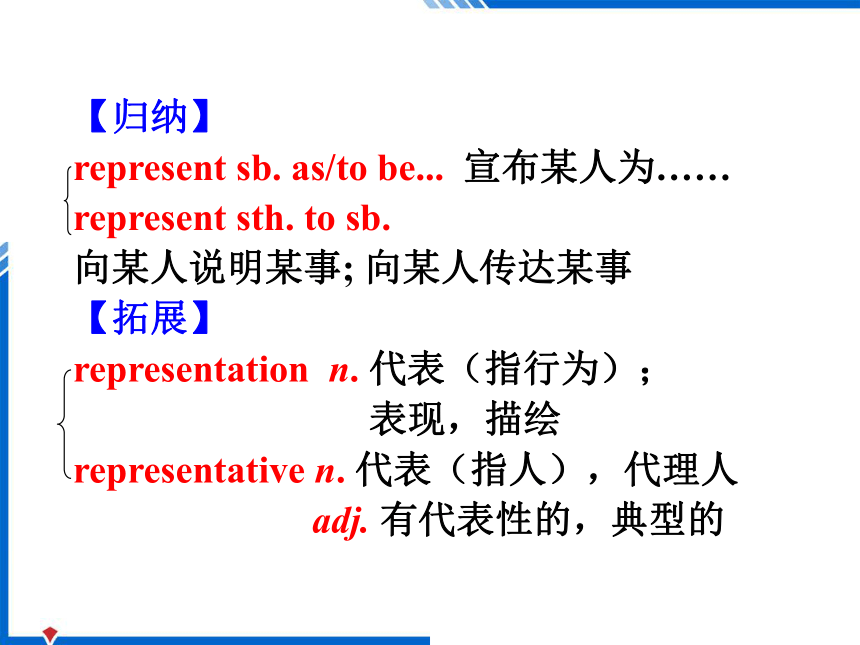
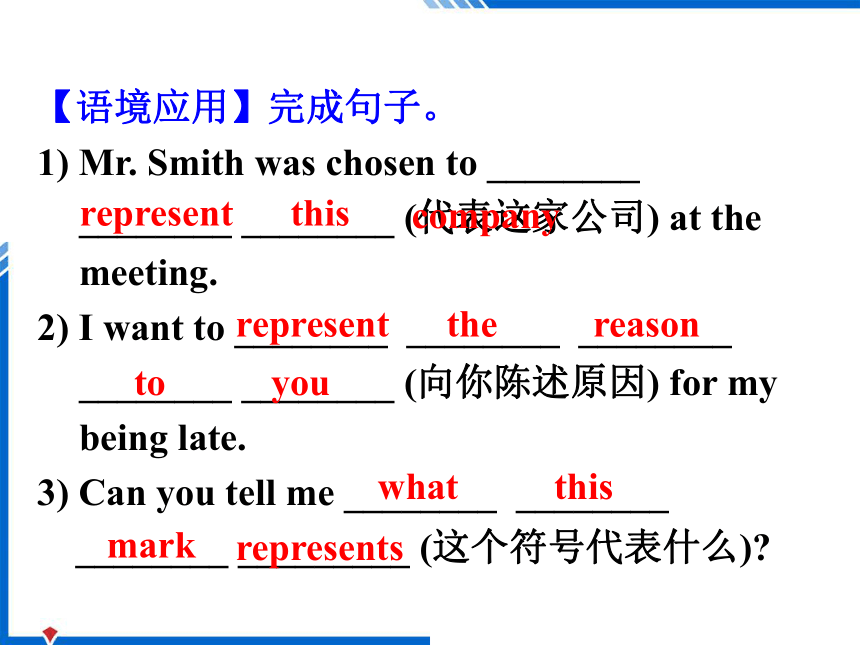
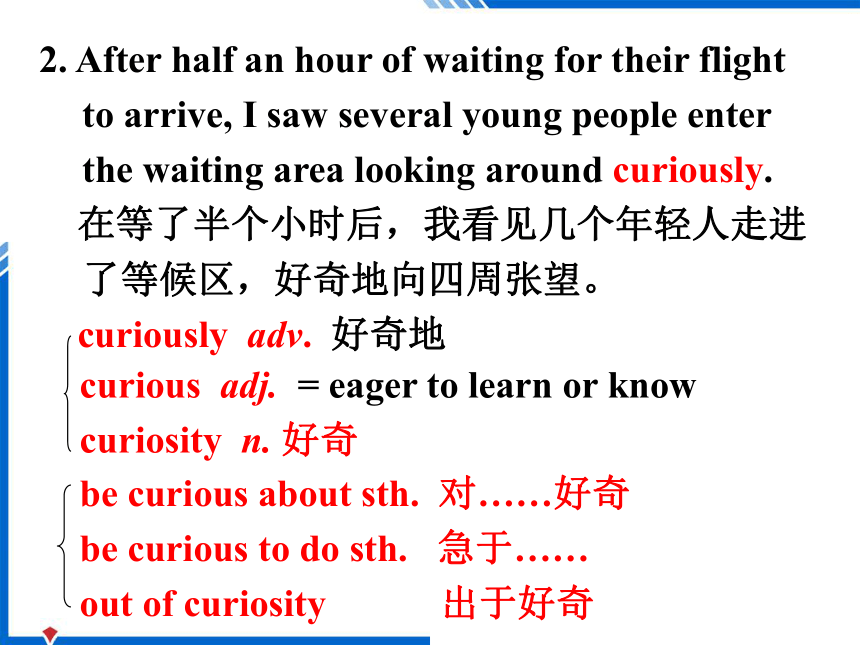
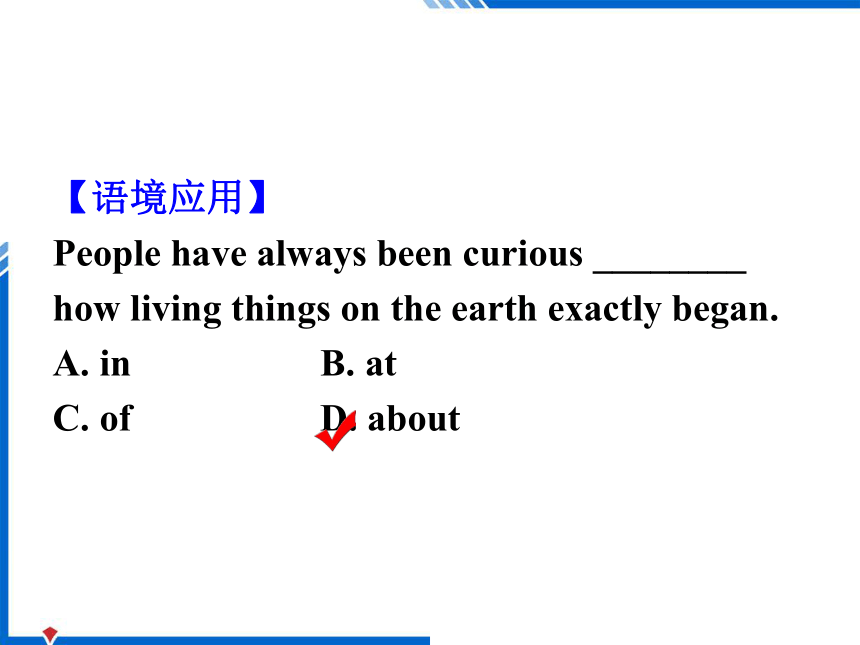
文档简介
Unit 4
Body language
To learn some useful words, expressions
and patterns in the passage.
Words:
represent, curious, approach, touch, likely
Expressions:
be likely to, in general
Patterns:
Not all…
Find the word from the text for each of these meanings.
1 action of defending oneself against an enemy’s attack
2 very probably
Discovering useful words and expressions
defence
likely
3 European country that is shaped like a boot
4 small restaurant provided by a school for its students or by a company for its employees
5 to be chosen to speak or act in place of someone
Italy
canteen
represent
6 to run or travel somewhere in a great hurry
7 to come nearer to something or someone from a great distance
8 group of people organized for a special purpose
dash
approach
association
9 either side or the face below the eye
10 the act of flying, especially scheduled
on a plane
cheek
flight
represent vt. 代表; 描绘; 体现; 象征; 宣称;
说明; 使明白
1. Yesterday, another student and I, representing our university’s student association, went to the Capital International Airport to meet this year’s international students.
昨天,我和另一个同学代表我们大学的学生会,去首都国际机场迎接今年的国际学生。
【归纳】
represent sb. as/to be... 宣布某人为……
represent sth. to sb.
向某人说明某事; 向某人传达某事
【拓展】
representation? n.?代表(指行为);
表现,描绘
representative?n.?代表(指人),代理人
adj.?有代表性的,典型的
【语境应用】完成句子。
1) Mr. Smith was chosen to ________? ________ ________ (代表这家公司) at the meeting.
2) I want to ________? ________? ________ ________ ________ (向你陈述原因) for my being late.
3) Can you tell me ________? ________?
________ _________ (这个符号代表什么)?
represent this
represent the reason
what this
company
to you
represents
mark
2. After half an hour of waiting for their flight to arrive, I saw several young people enter the waiting area looking around curiously.
在等了半个小时后,我看见几个年轻人走进了等候区,好奇地向四周张望。
curiously adv. 好奇地
curious adj. = eager to learn or know
curiosity n. 好奇
be curious about sth. 对……好奇
be curious to do sth. 急于……
out of curiosity 出于好奇
【语境应用】
People have always been curious ________ how living things on the earth exactly began.
A. in B. at C. of D. about
approach v. 接近; 靠近; 走近
n. 接近; 方法; 途径
3. Tony approached Julia, touched her shoulder and kissed her on the cheek!
托尼走近朱莉娅,摸了摸她的肩,并亲了亲她的脸!
【归纳】
at the approach of 在……快到的时候
make an approach to
接近;逼近;交涉;对……进行探讨
approach to 接近,近似,约等于;
(做某事)的方法(途径)
【语境应用】完成句子。
1) ___________ (approach) the city center, we saw a stone statue of about 10 meters in height.
2) At the meeting they discussed three different approaches __________ the study of mathematics.
Approaching
to
① 做……的方法:
the approach to (doing) sth.
the way to do/of (doing) sth.
the means of (doing) sth.
the method of (doing) sth.
② 与不同介词搭配:
with this method, in this way, by this means
approach way means method
【语境应用】用approach/way/means/method的适当形式填空。
1) He told me a new _________ to the study of English.
2) You must solve this problem with different _________.
3) The blocks are raised by ________ of pulleys (滑轮).
4) There are several possible ________ of payment.
approach
methods
means
ways
touch vt. 触摸, 接触, 触及, 轻触
e.g. I told you not to touch my things.
touch sb.
感动(某人)触动某人(某人的感情)
e.g. Her miserable experiences touched
us all deeply / touched our hearts.
她的不幸经历让我们深受触动/ 触
动了我们的心弦。
n. 接触,联系
get / keep in touch with sb.
与……取得/保持联系
be in/ out of touch (with sb.)
与……有/无联系
e.g. We’ve been out of touch for years.
我们已经好几年没有联系了。
4. She stepped back appearing surprised and put up her hands, as if in defence.
她向后退(了几步),显得很吃惊,并且举起手,好像在防御。
defence n. 防御; 保卫
【归纳】
in defence of 为了保卫;辩护
come to sb.’s defence 帮助(保护)某人
in self?defence 出于自卫
in sb.’s / sth.’s defence
为……辩护; 在……的防备下
【拓展】
defend vt. 保护;保卫
defend sb./sth. from/ against sb. /sth.
保护某人(某物)免受伤害; 保卫某人/某物
defend oneself against sth 为自己辩护defender n.后卫,防守队员;保护人
【语境应用】完成句子。
1) She had to defend herself _________ the guard dog.
2) The duty of a soldier is to _________________ (保卫国家).
3) She spoke _____________ her religious beliefs.
她为其宗教信仰辩护。
against
defend his country
in defence of
5. Not all cultures greet each other the
same way, nor are they comfortable
in the same way with touching or
distance between people.
翻译:
各种文化背景下的人相互问候的方式不尽相同,身体接触和相互间距的程度也不尽相同。
not all并非全都……,部分否定。
一些表示“全体”或“完全”意义的总括词, 如all, every (everybody, everything等), both, always, quite, wholly, entirely, altogether, completely等,含有这些词的否定句并非表示全部否定,而表示部分否定。
e.g. Not all explanations are correct.
并不是全部的解释都正确。
区分:
All explanations are not correct.
所有的解释都是不正确的。
部分否定
全部否定
【语境应用】翻译句子。
1) Not everything in the book is caught
by me.
2) Everything in the book is not caught
by me.
部分否定
全部否定
我不能完全掌握书中的内容。
书中所有的内容我都不能掌握。
3) ________________ are clever.
并不是两个孩子都聪明。
4) ____________________ clever.
这两个孩子都不聪明。
部分否定
全部否定
Not both children
Both children are not
6. However, people from places like Spain,
Italy or South American countries
approach others closely and are more
likely to touch them.
但是,来自像西班牙、意大利或南美等
国家的人会站在离别人很近的地方,而
且很可能(用身体)接触对方。
likely adj. 可能的、有希望的、预料的;
likely adv. 很可能
【归纳】
be likely to do...很可能/有希望做……, 主语是sb./sth.
sb./sth. is likely to do sth
It is likely that...
e.g. It is likely that they will go to Italy for their honeymoon. =
They will be likely to go to Italy for their honeymoon.
likely possible probable
likely从外表、迹象上进行判断, 有可能发生;
possible客观上有可能, 但希望小;
probable可能性比possible大, “很可能, 十有八九”。
可能性由小到大依次为possible, likely, probable。
likely既可以用人也可以用物作主语
It is likely that...或sb./ sth. is likely to...;
possible和probable都不能用人作主语:
It is possible (for sb.) to do sth.
It is possible that...
It is probable that...
【语境应用】完成句子。
如果继续吸烟,你的身体可能会很差。
_______________________________ you will suffer from bad health if you keep smoking.
You ______________ suffer from bad health if you keep smoking.
It is likely / possible / probable that
will be likely to
7. In general, though, studying international
customs can certainly help avoid difficulties in
today’s world of cultural crossroad!
但总的来说,在当今文化交融的世界,学习
不同国家的习俗肯定能帮助我们避免交往中
的困难。
1) adj. 普遍的,全面的
e.g. A matter of general concern/ interest
普遍(公众)关心/感兴趣的事情
Air-conditioner is in general use now.
2) 总的,整体的
in general 大体上, 通常, 总的来讲
e.g. In general, he is a good guy.
In general, German cars are of high
quality.
Because time is limited, he talked
about his plan in general.
generally speaking 一般而言, 总的来说
e.g. Generally speaking, this may be true.
Generally speaking, we enjoyed the
trip.
frankly speaking; honestly speaking
【归纳】
as a general rule 一般而言;通常
generally speaking 总的来说; 一般来说
【拓展】总而言之:
in short; on the whole; in a word
to sum up; all in all
【语境应用】完成句子。
1) __________ (general) speaking, about 10% of the candidates are eventually offered positions.
2) __________ general, there is a thriving black market in vehicle parts.
Generally
In
【拓展】“in +?名词”短语:
in fact 实际上,事实上???
in use? 在使用? ???
in order 按顺序;处于良好状态
in cash 用现金??? ?????????????
in charge 负责,管理?
in common 共同,共有???????
in danger 处于危险中?
in trouble 处于麻烦中? ????
in sight 看得见
1. After half an hour of waiting for their flight to arrive, I saw several young people enter the waiting area looking around curiously.
【句意】
在等待他们的航班半个小时之后,我看见几个年轻人走进了等候区,好奇地向四周张望。
SENTENCE EXPLANATIONS
【分析】
①简单句。
②see sb. do sth.看到某人做了某事。
③After half an hour of waiting for their flight to arrive是介词短语作时间状语。
④looking around curiously是动词-ing形式短语作enter的伴随状语。
【仿写】
在等了大约一小时雨停了之后,我们看到一个年轻男子提着一个手提箱从商店里走了出来。
After about an hour of waiting for the rain to stop, we saw a young man walk out of the shop carrying a suitcase.
2. They shook hands and then kissed each other twice on each cheek, since that is the French custom when adults meet people they know.
【句意】
他们握了握手,并且在对方的面颊上吻了两下,因为那是法国成年人见到熟人时的礼节。
【分析】
①主从复合句。
②They shook hands and then kissed each other twice on each cheek是主句,其中and连接两个并列的谓语shook和kissed。
③since ... meet people they know是原因状语从句,其中when adults meet people they know是时间状语从句,they know是省略了关系代词_____________的定语从句,修饰先行词people。
?who(m) / that
【仿写】
他保持沉默然后离开了,因为那是他被人们问到他不想回答的问题时的回答。
He kept silent and then went away, since that is his reply when people ask him the questions he doesn’t want to answer.
3. In the same way that people communicate with spoken language, they also express their feelings using unspoken “language” through physical distance, actions or posture.
【句意】
用口头语言交流的同时,人们还使用不出声的语言—身体间的距离、动作和姿态等,来表达情感。
【分析】
①主从复合句。
②In the same way that people communicate with spoken language是介词短语作状语,其中that people communicate with spoken language是定语从句,修饰先行词________。
?way
③在they also express ... actions or posture中,using unspoken “language”?through physical distance, actions or posture是动词-ing形式短语作方式状语。
【仿写】?
人们与他人相处的同时,他们总会用自己的规则作为标准去批评他人。
?In the same way that people get along with others, they always criticise others using their own rules as standards.
Words:
represent curiously approach touch likely
Phrases:
in general
Sentence pattern:
Not all…
I. 用合适的单词并用其正确形式填空。
1. People looked at him ________ and guessed who he might be.
2. A government spokesperson made a(n) ________ to the press.
3. There must have been some _______________. I didn’t order all these books.
curiously
state, greet, represent, curious, defend, major, misunderstand, spoken
statement
misunderstanding
4. Exercise has a(n) ________ part to play in preventing and treating disease.
5. The war has ended but government spending on ________ is still increasing.
6. They didn’t say anything, but they still kept to the ________ agreement between them.
7. Mr. Smith was chosen to ________ the company at the national trade meeting.
8. Jane took John’s suitcase and ________ him and gave him a kiss.
major
state, greet, represent, curious, defend, major, misunderstand, spoken
defence
unspoken
represent
greeted
II. 找出错误并改正。
1. The star walked in, following by a crowd of fans. ________
2. It can be helpful to share your feelings to someone you trust. ________
3. Peter is shy and he doesn’t like people standing too closely to him. ________
4. He is a first to admit that much of his success is due to his good looks. ________
followed
with
close
the
III. 根据括号内的汉语提示补全下面句子。
1. ________ ___________ (总的来说), boys like outdoor sports more than girls do.
2. The girl ________ ________ ________ ________ (伸出手) and picked up the toy.
3. It wasn’t a good thing; ________ ________ ________ (恰恰相反) it was a huge mistake.
4. I would like to ________ ________ ________ ________ ________ (把你介绍给我的朋友们).
In general/short
reached her hand(s)
out
on the
contrary
introduce you
to my friends
5. French people usually ________ ________ ________ (更喜欢买) goods that are made in France.
6. Young drivers ________ ________ ________ ________ (更可能) have accidents than older drivers.
prefer to
buy
are more
likely to
Body language
To learn some useful words, expressions
and patterns in the passage.
Words:
represent, curious, approach, touch, likely
Expressions:
be likely to, in general
Patterns:
Not all…
Find the word from the text for each of these meanings.
1 action of defending oneself against an enemy’s attack
2 very probably
Discovering useful words and expressions
defence
likely
3 European country that is shaped like a boot
4 small restaurant provided by a school for its students or by a company for its employees
5 to be chosen to speak or act in place of someone
Italy
canteen
represent
6 to run or travel somewhere in a great hurry
7 to come nearer to something or someone from a great distance
8 group of people organized for a special purpose
dash
approach
association
9 either side or the face below the eye
10 the act of flying, especially scheduled
on a plane
cheek
flight
represent vt. 代表; 描绘; 体现; 象征; 宣称;
说明; 使明白
1. Yesterday, another student and I, representing our university’s student association, went to the Capital International Airport to meet this year’s international students.
昨天,我和另一个同学代表我们大学的学生会,去首都国际机场迎接今年的国际学生。
【归纳】
represent sb. as/to be... 宣布某人为……
represent sth. to sb.
向某人说明某事; 向某人传达某事
【拓展】
representation? n.?代表(指行为);
表现,描绘
representative?n.?代表(指人),代理人
adj.?有代表性的,典型的
【语境应用】完成句子。
1) Mr. Smith was chosen to ________? ________ ________ (代表这家公司) at the meeting.
2) I want to ________? ________? ________ ________ ________ (向你陈述原因) for my being late.
3) Can you tell me ________? ________?
________ _________ (这个符号代表什么)?
represent this
represent the reason
what this
company
to you
represents
mark
2. After half an hour of waiting for their flight to arrive, I saw several young people enter the waiting area looking around curiously.
在等了半个小时后,我看见几个年轻人走进了等候区,好奇地向四周张望。
curiously adv. 好奇地
curious adj. = eager to learn or know
curiosity n. 好奇
be curious about sth. 对……好奇
be curious to do sth. 急于……
out of curiosity 出于好奇
【语境应用】
People have always been curious ________ how living things on the earth exactly began.
A. in B. at C. of D. about
approach v. 接近; 靠近; 走近
n. 接近; 方法; 途径
3. Tony approached Julia, touched her shoulder and kissed her on the cheek!
托尼走近朱莉娅,摸了摸她的肩,并亲了亲她的脸!
【归纳】
at the approach of 在……快到的时候
make an approach to
接近;逼近;交涉;对……进行探讨
approach to 接近,近似,约等于;
(做某事)的方法(途径)
【语境应用】完成句子。
1) ___________ (approach) the city center, we saw a stone statue of about 10 meters in height.
2) At the meeting they discussed three different approaches __________ the study of mathematics.
Approaching
to
① 做……的方法:
the approach to (doing) sth.
the way to do/of (doing) sth.
the means of (doing) sth.
the method of (doing) sth.
② 与不同介词搭配:
with this method, in this way, by this means
approach way means method
【语境应用】用approach/way/means/method的适当形式填空。
1) He told me a new _________ to the study of English.
2) You must solve this problem with different _________.
3) The blocks are raised by ________ of pulleys (滑轮).
4) There are several possible ________ of payment.
approach
methods
means
ways
touch vt. 触摸, 接触, 触及, 轻触
e.g. I told you not to touch my things.
touch sb.
感动(某人)触动某人(某人的感情)
e.g. Her miserable experiences touched
us all deeply / touched our hearts.
她的不幸经历让我们深受触动/ 触
动了我们的心弦。
n. 接触,联系
get / keep in touch with sb.
与……取得/保持联系
be in/ out of touch (with sb.)
与……有/无联系
e.g. We’ve been out of touch for years.
我们已经好几年没有联系了。
4. She stepped back appearing surprised and put up her hands, as if in defence.
她向后退(了几步),显得很吃惊,并且举起手,好像在防御。
defence n. 防御; 保卫
【归纳】
in defence of 为了保卫;辩护
come to sb.’s defence 帮助(保护)某人
in self?defence 出于自卫
in sb.’s / sth.’s defence
为……辩护; 在……的防备下
【拓展】
defend vt. 保护;保卫
defend sb./sth. from/ against sb. /sth.
保护某人(某物)免受伤害; 保卫某人/某物
defend oneself against sth 为自己辩护defender n.后卫,防守队员;保护人
【语境应用】完成句子。
1) She had to defend herself _________ the guard dog.
2) The duty of a soldier is to _________________ (保卫国家).
3) She spoke _____________ her religious beliefs.
她为其宗教信仰辩护。
against
defend his country
in defence of
5. Not all cultures greet each other the
same way, nor are they comfortable
in the same way with touching or
distance between people.
翻译:
各种文化背景下的人相互问候的方式不尽相同,身体接触和相互间距的程度也不尽相同。
not all并非全都……,部分否定。
一些表示“全体”或“完全”意义的总括词, 如all, every (everybody, everything等), both, always, quite, wholly, entirely, altogether, completely等,含有这些词的否定句并非表示全部否定,而表示部分否定。
e.g. Not all explanations are correct.
并不是全部的解释都正确。
区分:
All explanations are not correct.
所有的解释都是不正确的。
部分否定
全部否定
【语境应用】翻译句子。
1) Not everything in the book is caught
by me.
2) Everything in the book is not caught
by me.
部分否定
全部否定
我不能完全掌握书中的内容。
书中所有的内容我都不能掌握。
3) ________________ are clever.
并不是两个孩子都聪明。
4) ____________________ clever.
这两个孩子都不聪明。
部分否定
全部否定
Not both children
Both children are not
6. However, people from places like Spain,
Italy or South American countries
approach others closely and are more
likely to touch them.
但是,来自像西班牙、意大利或南美等
国家的人会站在离别人很近的地方,而
且很可能(用身体)接触对方。
likely adj. 可能的、有希望的、预料的;
likely adv. 很可能
【归纳】
be likely to do...很可能/有希望做……, 主语是sb./sth.
sb./sth. is likely to do sth
It is likely that...
e.g. It is likely that they will go to Italy for their honeymoon. =
They will be likely to go to Italy for their honeymoon.
likely possible probable
likely从外表、迹象上进行判断, 有可能发生;
possible客观上有可能, 但希望小;
probable可能性比possible大, “很可能, 十有八九”。
可能性由小到大依次为possible, likely, probable。
likely既可以用人也可以用物作主语
It is likely that...或sb./ sth. is likely to...;
possible和probable都不能用人作主语:
It is possible (for sb.) to do sth.
It is possible that...
It is probable that...
【语境应用】完成句子。
如果继续吸烟,你的身体可能会很差。
_______________________________ you will suffer from bad health if you keep smoking.
You ______________ suffer from bad health if you keep smoking.
It is likely / possible / probable that
will be likely to
7. In general, though, studying international
customs can certainly help avoid difficulties in
today’s world of cultural crossroad!
但总的来说,在当今文化交融的世界,学习
不同国家的习俗肯定能帮助我们避免交往中
的困难。
1) adj. 普遍的,全面的
e.g. A matter of general concern/ interest
普遍(公众)关心/感兴趣的事情
Air-conditioner is in general use now.
2) 总的,整体的
in general 大体上, 通常, 总的来讲
e.g. In general, he is a good guy.
In general, German cars are of high
quality.
Because time is limited, he talked
about his plan in general.
generally speaking 一般而言, 总的来说
e.g. Generally speaking, this may be true.
Generally speaking, we enjoyed the
trip.
frankly speaking; honestly speaking
【归纳】
as a general rule 一般而言;通常
generally speaking 总的来说; 一般来说
【拓展】总而言之:
in short; on the whole; in a word
to sum up; all in all
【语境应用】完成句子。
1) __________ (general) speaking, about 10% of the candidates are eventually offered positions.
2) __________ general, there is a thriving black market in vehicle parts.
Generally
In
【拓展】“in +?名词”短语:
in fact 实际上,事实上???
in use? 在使用? ???
in order 按顺序;处于良好状态
in cash 用现金??? ?????????????
in charge 负责,管理?
in common 共同,共有???????
in danger 处于危险中?
in trouble 处于麻烦中? ????
in sight 看得见
1. After half an hour of waiting for their flight to arrive, I saw several young people enter the waiting area looking around curiously.
【句意】
在等待他们的航班半个小时之后,我看见几个年轻人走进了等候区,好奇地向四周张望。
SENTENCE EXPLANATIONS
【分析】
①简单句。
②see sb. do sth.看到某人做了某事。
③After half an hour of waiting for their flight to arrive是介词短语作时间状语。
④looking around curiously是动词-ing形式短语作enter的伴随状语。
【仿写】
在等了大约一小时雨停了之后,我们看到一个年轻男子提着一个手提箱从商店里走了出来。
After about an hour of waiting for the rain to stop, we saw a young man walk out of the shop carrying a suitcase.
2. They shook hands and then kissed each other twice on each cheek, since that is the French custom when adults meet people they know.
【句意】
他们握了握手,并且在对方的面颊上吻了两下,因为那是法国成年人见到熟人时的礼节。
【分析】
①主从复合句。
②They shook hands and then kissed each other twice on each cheek是主句,其中and连接两个并列的谓语shook和kissed。
③since ... meet people they know是原因状语从句,其中when adults meet people they know是时间状语从句,they know是省略了关系代词_____________的定语从句,修饰先行词people。
?who(m) / that
【仿写】
他保持沉默然后离开了,因为那是他被人们问到他不想回答的问题时的回答。
He kept silent and then went away, since that is his reply when people ask him the questions he doesn’t want to answer.
3. In the same way that people communicate with spoken language, they also express their feelings using unspoken “language” through physical distance, actions or posture.
【句意】
用口头语言交流的同时,人们还使用不出声的语言—身体间的距离、动作和姿态等,来表达情感。
【分析】
①主从复合句。
②In the same way that people communicate with spoken language是介词短语作状语,其中that people communicate with spoken language是定语从句,修饰先行词________。
?way
③在they also express ... actions or posture中,using unspoken “language”?through physical distance, actions or posture是动词-ing形式短语作方式状语。
【仿写】?
人们与他人相处的同时,他们总会用自己的规则作为标准去批评他人。
?In the same way that people get along with others, they always criticise others using their own rules as standards.
Words:
represent curiously approach touch likely
Phrases:
in general
Sentence pattern:
Not all…
I. 用合适的单词并用其正确形式填空。
1. People looked at him ________ and guessed who he might be.
2. A government spokesperson made a(n) ________ to the press.
3. There must have been some _______________. I didn’t order all these books.
curiously
state, greet, represent, curious, defend, major, misunderstand, spoken
statement
misunderstanding
4. Exercise has a(n) ________ part to play in preventing and treating disease.
5. The war has ended but government spending on ________ is still increasing.
6. They didn’t say anything, but they still kept to the ________ agreement between them.
7. Mr. Smith was chosen to ________ the company at the national trade meeting.
8. Jane took John’s suitcase and ________ him and gave him a kiss.
major
state, greet, represent, curious, defend, major, misunderstand, spoken
defence
unspoken
represent
greeted
II. 找出错误并改正。
1. The star walked in, following by a crowd of fans. ________
2. It can be helpful to share your feelings to someone you trust. ________
3. Peter is shy and he doesn’t like people standing too closely to him. ________
4. He is a first to admit that much of his success is due to his good looks. ________
followed
with
close
the
III. 根据括号内的汉语提示补全下面句子。
1. ________ ___________ (总的来说), boys like outdoor sports more than girls do.
2. The girl ________ ________ ________ ________ (伸出手) and picked up the toy.
3. It wasn’t a good thing; ________ ________ ________ (恰恰相反) it was a huge mistake.
4. I would like to ________ ________ ________ ________ ________ (把你介绍给我的朋友们).
In general/short
reached her hand(s)
out
on the
contrary
introduce you
to my friends
5. French people usually ________ ________ ________ (更喜欢买) goods that are made in France.
6. Young drivers ________ ________ ________ ________ (更可能) have accidents than older drivers.
prefer to
buy
are more
likely to
同课章节目录
